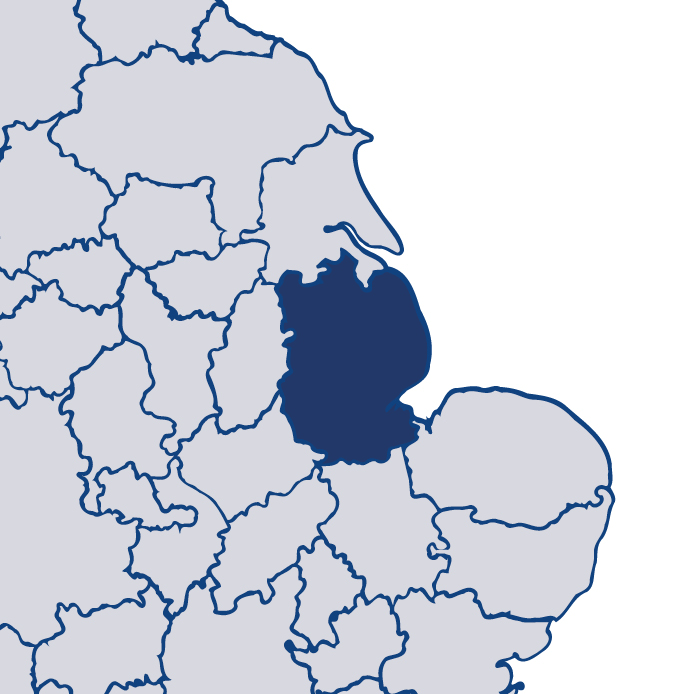Lincolnshire 2014
Read more about LincolnshireThis is the first PEEL assessment of Lincolnshire Police. In making this assessment I have used my professional judgment to consider the evidence available from inspections undertaken in the past 12 months.
The available evidence indicates that:
in terms of its effectiveness, in general, the force is good at reducing crime and preventing offending and is good at tackling anti-social behaviour. However, it requires improvement in the way it investigates offending;
the efficiency with which the force carries out its responsibilities is good; and
the force is acting to achieve fairness and legitimacy in most of the practices that were examined this year.
HMI's observations
In making this first PEEL assessment of Lincolnshire I have taken into account the challenges to policing the area.
Lincolnshire is the third largest policing area in England, with most of the population, including the student population in its one city, Lincoln. It has high levels of deprivation along the east coast. Over the last few years the local agricultural industry has attracted substantial numbers of workers from Eastern Europe which adds to the complexity of policing the county.
I have been impressed with the way that the force works with its communities and partners, such as local councils, to understand local priorities in its endeavours to prevent and to cut crime. The force has a positive approach to tackling anti-social behaviour and it provides tailored support to meet the needs of many victims. It also works well to keep victims of domestic abuse safe.
The force has taken decisive action to meet its funding challenge, achieving substantial savings in extremely difficult circumstances. Being a relatively small, low-cost force, Lincolnshire Police has had a far more difficult challenge than most and it has demonstrated an outstanding response in achieving efficiency. The force has put in place a second major change programme which has three key elements: reducing demand on the front line, improving IT to make better use of police time, and changing the workforce mix. Despite this positive response, I am concerned that its options to achieve future savings in this continuing era of austerity, while maintaining its current level of service to the communities of Lincolnshire beyond 2016, are extremely limited.
I am pleased that Lincolnshire Police has made good progress in reinforcing ethical and professional behaviour across the force.
I am also impressed that the force’s approach to crime-recording is good, with a high degree of accuracy.
I do have concerns about weaknesses in the quality of some of the force’s crime investigations and the way they are supervised. Delays in investigations are compromising the force’s ability to investigate crimes well, and to provide an effective service to some victims. There is also considerable scope to improve the integrated offender management programme, which only applies to a narrow range of offenders.
The force is part of the successful East Midlands collaboration which provides a range of policing and support services including major crime, special branch, forensics and serious and organised crime. The collaboration aims to promote a more cost-effective provision of these important policing services through forces working together. The force has made extensive use of this collaboration as well as outsourcing to a private sector partner; this contributes 31 percent of its savings. This is a significant achievement.
Our intention is to examine leadership specifically as part of future PEEL Assessments, once criteria have been established. This will allow us to take account of the College of Policing review of leadership that is currently underway.
In common with other forces, there is a need to build on the force’s understanding of the changing demands for its police services.
Over the past 12 months, there have been a number of inspections made of Lincolnshire Police that have suggested that the need for better management of how quickly crimes are allocated to officers is a recurrent issue.
I will be interested to see how the force responds to the areas HMIC has identified for improvement across a range of areas over the next 12 months.
Effectiveness
How well the force tackles crime
Last updated 12/11/2014
Lincolnshire Police is good at reducing crime and preventing offending. The force requires improvement in investigating offending. It is good at tackling anti-social behaviour.
Lincolnshire is a comparatively low crime area and crime has fallen in the county at a faster rate than across England and Wales as a whole over the last four years.
Lincolnshire Police has strong links with its communities; it works well with them and partner agencies to understand local priorities and concerns and provide a joined up response to victims. However, HMIC found that the approach to integrated offender management is weak.
HMIC remains concerned that the force’s ability to investigate crime is being hampered by the way it manages investigations. There are delays in the process and inconsistencies in practices which means that its ability to bring offenders to justice may be limited. However, restorative justice is used effectively to resolve investigations.
The force’s approach to managing anti-social behaviour in the county is effective. It works closely with partner agencies to identify anti-social behaviour at an early stage, understand the risks and provide tailored support to victims and perpetrators.
Further insights on effectiveness
The domestic abuse inspection found that Lincolnshire was generally effective at tackling domestic abuse. However, there were some areas that required further improvement before there could be confidence that the police were working as well as they should to help keep victims of domestic abuse safe. The crime inspection found evidence that Lincolnshire had made good progress in improving its response to domestic abuse.
A dedicated multi-agency hub for combating child sexual exploitation and finding missing children has recently been established by Lincolnshire Police. This is positive and demonstrates that the force has an understanding of – and responsiveness to – emerging crime types.
The value for money inspection found that Lincolnshire was a member of a long-standing regional force collaboration which tackled serious and organised crime and domestic extremism and terrorism, and investigated major crime, including homicides and kidnap.
Efficiency
How well the force delivers value for money
Last updated 12/11/2014
Lincolnshire Police has demonstrated a good response in meeting its financial challenge over the spending review period, achieving substantial savings in extremely difficult circumstances. The force has the lowest workforce costs in England and Wales, and makes extensive use of collaboration and outsourcing to maximise efficiency. Its options to achieve future savings in this continuing era of austerity, without cutting its frontline workforce and eroding neighbourhood policing, are extremely limited.
Lincolnshire is on track to achieve its required savings of £20m over this spending review period, with plans in place to achieve further savings in 2015/16. It is a low income and efficient force, so faces a particularly difficult challenge. The force has made good progress in meeting its financial challenge. It has developed a detailed change programme which has allowed it to reduce costs while continuing to fight crime. It has now put in place a second major change programme which has three key elements: reducing demand on the front line, improving IT to make better use of police time, and changing the workforce mix. Over the next two years it is planning to maintain the front line and sustain service provision.
Despite this positive response, HMIC has concerns about the ability of the force to maintain its current level of service to the communities of Lincolnshire beyond 2016. Having taken decisive action to close the funding gap over the current spending review, the force has fewer options to achieve further savings.
The force estimates that these alone will not identify the savings required to meet the projected gap, but given the size of the funding shortfall, it is difficult to consider how the force can continue to provide local policing in the same way or provide the same level of service to the public in the future. We will continue to monitor progress closely.
Legitimacy
Does the force act with integrity and provide a service the public expects?
Last updated 12/11/2014
Lincolnshire Police has made excellent progress in reinforcing ethical and professional behaviour across the force. Both the chief constable and deputy chief constable (DCC) show clear leadership and emphasise the importance of ethical standards. All staff know the standards expected of them and the force has plans to integrate its existing values with the new Code of Ethics. The force has systems in place to enable it to respond to intelligence about corruption or unprofessional behaviour, although it is limited in its ability to be more proactive. Information security is a key strength for the force and the force demonstrates the highest levels of information security. However, it needs to develop its existing checking mechanisms when gifts and hospitality are declined and business interest applications are withdrawn.
Further insights on legitimacy
The Crime Survey for England and Wales (12 months to March 2013) found that the proportion of respondents who think that the force does an excellent/good job was less than the figure across England and Wales. The same survey over the same period found that the proportion that agrees the force deals with local concerns was broadly in line with the figure for England and Wales. The force’s own victim satisfaction survey (12 months to June 2014) found that the proportion of victims who were satisfied with their experience was broadly in line with the figure across England and Wales.
The crime data integrity inspection found that frontline officers and staff, including call-takers, understood the importance of meeting the needs of the victim when considering crime-recording and investigation. The inspection on domestic abuse found that there were competent and experienced staff in the control room, dealing with calls effectively. Staff understood the importance of identifying repeat victims but they did not always ask the right questions to establish whether the caller had been a victim before, or whether the victim was particularly vulnerable.
The force has good crime-recording procedures in place when receiving reports of crime, meaning that victims of crime receive the service they should when they first report a crime.
However, HMIC is concerned with the accuracy of the decisions taken by the force when making no-crime decisions (cancelling a recorded crime), too many of which are incorrect. The force needs to take action to improve, serve the victims of these crimes and provide the public with confidence in the force’s crime data.
Key facts – 2019/20

Force Area
Population
Workforce
Victim-based crimes
Cost
Points of context provided by the force
A low level of funding means the force has significant future cost pressures to maintain acceptable staffing levels and sustained service to the community.
Lincolnshire is a relatively safe place to live with low crime rates. Lincoln City creates challenges in policing the night-time economy.
Police and crime plan priorities
The priorities in the Police and Crime Plan for Lincolnshire 2013 – 2017 are:
- Reducing crime
- A fair deal for the people of Lincolnshire
- Police and services that are there when you need them.





